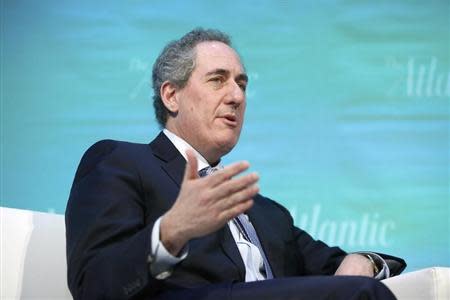Japan, U.S. make progress in trade talks; key gaps remain
By Antoni Slodkowski TOKYO (Reuters) - Japanese and U.S. trade officials made progress on Wednesday in negotiations meant to spur a broad Pacific trade pact and prepare for a visit by President Barack Obama, but they remain apart on some major issues, both sides said. "We made some progress, but we still have gaps between us," U.S. Trade Representative Michael Froman told reporters after 11 hours of negotiations with Japanese Economy Minister Akira Amari. Froman said he looked forward to more talks on Thursday. Japan and the United States are seeking a two-way trade deal, regarded as a key part of the U.S.-led Trans-Pacific Partnership (TPP) that is the centerpiece of Washington's push to increase its Asian presence, before Obama travels to Japan for an April 24-25 state visit. The tone of the cabinet-level talks appeared brighter after recent rounds in which the two sides accused each other of inflexibility. Amari said "debate has deepened considerably in some areas" in the talks, which focus on access to Japan's agricultural market and both countries' car markets. "But there's still considerable distance" between the two sides, he added. Froman said there were several issues that the parties still disagreed on and "were working our way through them". Despite the Obama visit looming, Froman echoed recent remarks by Japanese officials that they are not setting any deadlines in the bilateral talks. AMBITION Japanese Prime Minister Shinzo Abe has touted the TPP framework as a key part of his growth strategy but the outlook for a Japan-U.S. deal is cloudy as both sides accuse each other of inflexibility. Australian Prime Minister Tony Abbott and Abe confirmed a basic trade agreement on Monday, overcoming sticking points on beef and autos that had threatened to stymie a deal, and agreed to work towards signing it as soon as possible. "Clearly we are looking for a level of ambition in TPP that is significantly higher than that," Froman told reporters on Tuesday upon arriving in Japan. He told U.S. lawmakers last week that Japan's reluctance to lower trade barriers was holding up agreement on the TPP, a 12-nation grouping that would stretch from Asia to Latin America. Japanese officials say Washington needs to be more flexible. The United States wants Japan to open its rice, beef and pork, dairy and sugar sectors - politically powerful sectors that Abe has vowed to defend. Japan wants a timetable on U.S. promises to drop tariffs of 2.5 percent on imports of passenger cars and 25 percent on light trucks. Abe called for flexibility and said he hoped that both parties would end up feeling that they were in a mutually beneficial situation, as with the Japan-Australia agreement. "I think we can say Japan and the United States are dominant among parties participating in TPP talks in terms of economy," he told Japanese television on Tuesday. "If Japan and the United States fail to reach an agreement, TPP could collapse ... The important thing is that it would be pointless if Japan and the United States remained unyielding and that happened." (Additional reporting by Kaori Kaneko and Elaine Lies; Editing by William Mallard and Robert Birsel)



